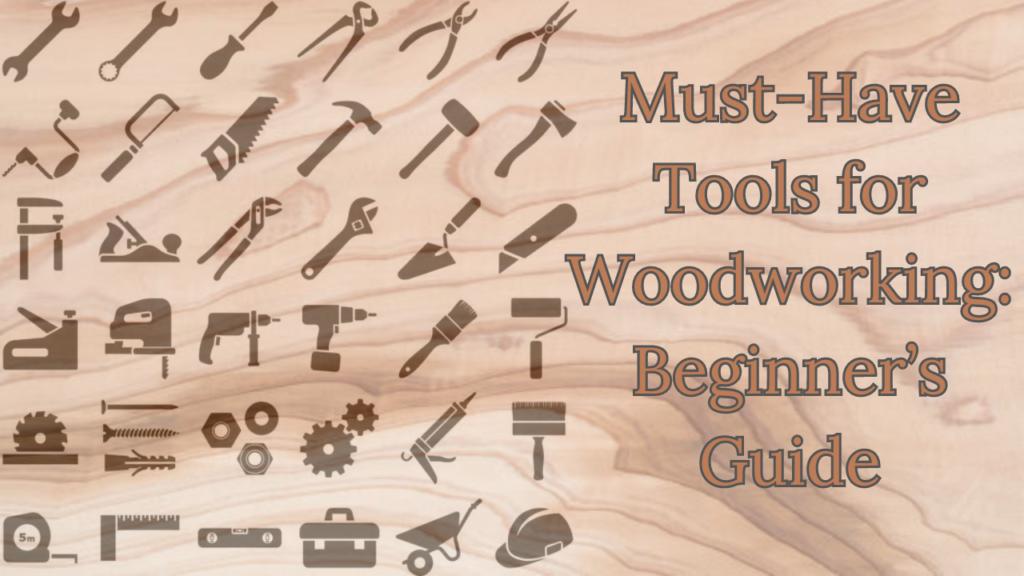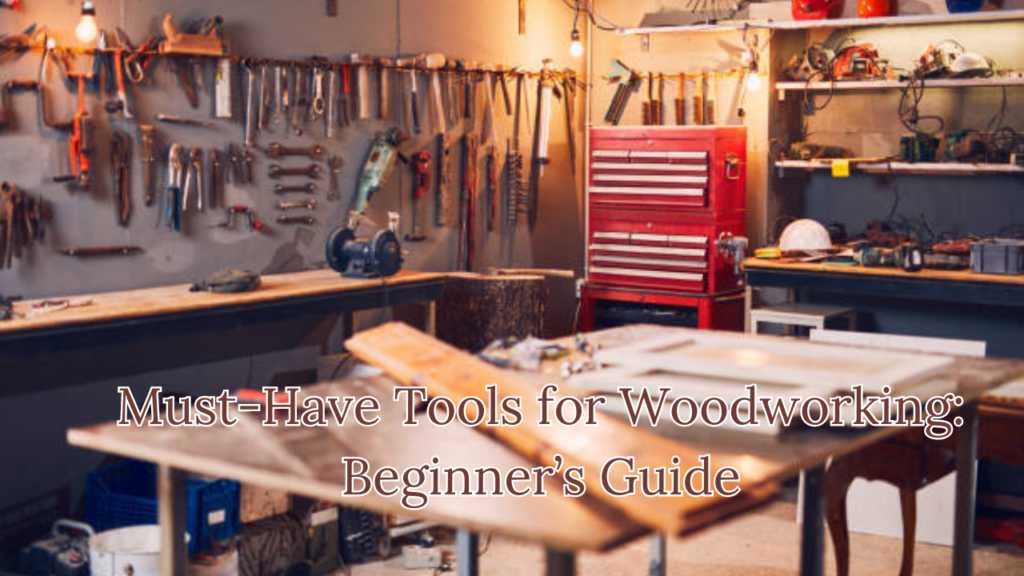
Outline of the Article
- Introduction
- Brief overview of woodworking for beginners
- Importance of having the right tools
- Setting Up Your Workspace
- Choosing the right location
- Organizing your tools for efficiency
- Essential Woodworking Tools for Beginners
- Workbench: The foundation of your workspace
- Hand Saw: Versatile cutting tool for various tasks
- Chisel: Precision carving and shaping
- Hammer and Mallet: Essential for driving in nails and chiseling
- Measuring and Marking Tools: Accurate measurements for precise cuts
- Power Drill: Versatile tool for drilling holes and driving screws
- Circular Saw: Efficient cutting for larger pieces
- Orbital Sander: Smoothing out surfaces for a polished finish
- Clamps: Securing wood pieces for stability
- Safety Equipment: Protecting yourself during woodworking
- Choosing Quality Tools on a Budget
- Researching affordable yet reliable brands
- Prioritizing essential tools for your initial setup
- Woodworking Techniques for Beginners
- Basic cutting and shaping methods
- Tips for using each tool effectively
- Safety First: Using Protective Gear
- Importance of wearing safety glasses, gloves, and ear protection
- Tips for maintaining a safe workspace
- Building Your First Project: A Step-by-Step Guide
- Simple woodworking project for beginners
- Applying the skills learned with the must-have tools
- Common Mistakes to Avoid
- Overlooking safety precautions
- Neglecting tool maintenance
- Expanding Your Tool Collection
- Gradually adding more advanced tools
- Growing your skills as a woodworker
- Tips for Finding Woodworking Projects Online
- Utilizing online resources for project ideas
- Joining woodworking communities for inspiration
- DIY Woodworking vs. Buying Pre-made Furniture
- Pros and cons of each approach
- Making informed decisions based on your preferences
- Troubleshooting Common Woodworking Issues
- Dealing with splinters and rough edges
- Fixing mistakes in your projects
- Staying Inspired: Learning from Experienced Woodworkers
- Following woodworking blogs and YouTube channels
- Attending workshops and joining local woodworking groups
- Maintaining and Upgrading Your Tools
- Regular cleaning and maintenance tips
- Knowing when it’s time to upgrade certain tools
- Conclusion
- Summarizing the key points
- Encouraging beginners to start their woodworking journey
Must-Have Tools for Woodworking: Beginner’s Guide

Woodworking is a rewarding and creative hobby that allows individuals to craft beautiful and functional pieces from wood. For beginners, having the right tools is essential to ensure a smooth and enjoyable woodworking experience. In this guide, we’ll explore the must-have tools for woodworking, providing a comprehensive list and valuable tips for those just starting.
Introduction
Embarking on a woodworking journey is an exciting endeavor, but without the proper tools, it can quickly turn into a frustrating experience. Whether you’re looking to create intricate wood carvings or build practical furniture pieces, having the right tools is crucial. In this beginner’s guide, we’ll walk you through the essential woodworking tools that every novice should have in their arsenal.
Setting Up Your Workspace
Before delving into the world of woodworking, it’s essential to set up a dedicated and organized workspace. Choose a location with ample light and ventilation, and organize your tools in a way that promotes efficiency. A well-organized workspace sets the foundation for a successful woodworking journey.
Essential Woodworking Tools for Beginners
Workbench: The Foundation of Your Workspace
The workbench is the centerpiece of any woodworking shop. It provides a stable surface for various tasks, from cutting to assembly. When selecting a workbench, consider its size, stability, and the material it’s made from.
Hand Saw: Versatile Cutting Tool for Various Tasks
A reliable hand saw is a fundamental tool for any woodworker. It allows for precise and controlled cuts, making it suitable for a wide range of woodworking projects. Choose a hand saw with a comfortable grip and sharp teeth for optimal performance.
Chisel: Precision Carving and Shaping
Chisels are indispensable for carving and shaping wood. They come in various sizes and shapes, allowing for intricate detailing. Invest in a set of quality chisels and learn how to keep them sharp for precise woodworking.
Hammer and Mallet: Essential for Driving in Nails and Chiseling
A combination of a hammer and mallet is essential for driving in nails and chiseling wood. The hammer is suitable for heavier tasks, while the mallet is gentler and less likely to damage delicate surfaces.
Measuring and Marking Tools: Accurate Measurements for Precise Cuts
Accurate measurements are the key to successful woodworking. Invest in a combination square, measuring tape, and marking gauge to ensure your cuts are precise and your projects come together seamlessly.
Power Drill: Versatile Tool for Drilling Holes and Driving Screws
A power drill is a versatile tool that serves multiple purposes in woodworking. From drilling holes to driving screws, a power drill is a must-have for efficiency and precision. Consider a cordless drill for greater flexibility in your workspace.
Circular Saw: Efficient Cutting for Larger Pieces
For cutting larger pieces of wood quickly and efficiently, a circular saw is invaluable. It’s a versatile tool that can handle straight cuts and bevels, making it essential for various woodworking projects.
Orbital Sander: Smoothing Out Surfaces for a Polished Finish
Achieving a smooth and polished finish is made easier with an orbital sander. This tool is perfect for smoothing out rough surfaces and preparing wood for finishing touches. Choose sandpaper with different grits for varying levels of smoothness.
Clamps: Securing Wood Pieces for Stability
Clamps are essential for securing wood pieces during assembly and glue-up. They provide stability and ensure that your projects are held together firmly as the glue dries. Invest in a variety of clamps, including bar clamps, pipe clamps, and spring clamps.
Safety Equipment: Protecting Yourself During Woodworking
Safety should always be a top priority in woodworking. Invest in safety glasses, gloves, and ear protection to shield yourself from potential hazards. Prioritize your well-being to enjoy a safe and fulfilling woodworking experience.
Choosing Quality Tools on a Budget
Woodworking tools can be a significant investment, but there are ways to build your collection without breaking the bank. Research affordable yet reliable brands, and prioritize purchasing the most essential tools for your initial setup. Quality doesn’t always have to come with a hefty price tag.
Woodworking Techniques for Beginners
As a beginner, it’s essential to familiarize yourself with basic woodworking techniques. Learn the proper way to use each tool, from the hand saw to the chisel, and practice making precise cuts and shaping wood. Building a solid foundation in woodworking techniques will set you up for success in your future projects.
Safety First: Using Protective Gear
Woodworking involves various tools and processes that can pose safety risks. Always wear safety glasses to protect your eyes from debris, gloves to shield your hands, and ear protection to reduce noise exposure. Creating a safe workspace ensures an enjoyable and injury-free woodworking experience.
Building Your First Project: A Step-by-Step Guide
Now that you have your must-have tools and basic woodworking skills, it’s time to embark on your first project. Start with a simple project, such as a small shelf or a wooden box, to apply the skills you’ve learned. Follow a step-by-step guide, and don’t hesitate to seek guidance from online tutorials or experienced woodworkers.
Common Mistakes to Avoid
In the excitement of starting a new hobby, beginners often make common mistakes that can hinder their progress. Avoid overlooking safety precautions, and be diligent in following proper techniques for tool usage. Additionally, don’t neglect the maintenance of your tools, as a well-maintained tool performs better and lasts longer.
Expanding Your Tool Collection
As you gain more experience in woodworking, you may find the need to expand your tool collection. Gradually add more advanced tools, such as a router or a jigsaw, to enhance your capabilities. Investing in quality tools as your skills progress will contribute to the success and efficiency of your projects.
Tips for Finding Woodworking Projects Online
If you’re ever in need of inspiration or project ideas, the internet is a treasure trove of woodworking resources. Explore online platforms, such as woodworking blogs and YouTube channels, for creative project ideas and detailed tutorials. Joining online woodworking communities also provides an opportunity to connect with fellow enthusiasts and share experiences.
DIY Woodworking vs. Buying Pre-made Furniture
One decision that every woodworker faces is whether to create furniture from scratch or purchase pre-made pieces. Consider the pros and cons of each approach. While DIY woodworking allows for customization and a sense of accomplishment, buying pre-made furniture can save time and effort. Find the balance that suits your preferences and aligns with your woodworking goals.
Troubleshooting Common Woodworking Issues
Woodworking projects may encounter challenges along the way. From dealing with splinters to correcting mistakes in your projects, knowing how to troubleshoot common issues is part of the learning process. Don’t be discouraged by setbacks; instead, view them as opportunities to improve and refine your skills.
Staying Inspired: Learning from Experienced Woodworkers
To stay inspired and continually improve your woodworking skills, follow experienced woodworkers online. Subscribe to woodworking blogs, YouTube channels, and social media accounts that share tips, projects, and insights. Additionally, consider attending workshops or joining local woodworking groups to connect with like-minded individuals and learn from their experiences.
Maintaining and Upgrading Your Tools
Regular maintenance is crucial for keeping your tools in optimal condition. Clean your tools after each use, sharpen blades as needed, and store them in a dry and secure place. Recognize when it’s time to upgrade certain tools to match your evolving skills and project requirements.
Conclusion
In conclusion, embarking on a woodworking journey as a beginner is an exciting endeavor that requires the right tools and knowledge. By investing in essential tools, practicing basic woodworking techniques, and prioritizing safety, you can set yourself up for success. Start with simple projects, learn from your experiences, and gradually expand your tool collection as your skills grow. Woodworking is a rewarding hobby that offers endless possibilities for creativity and self-expression.
FAQs
- What safety equipment is essential for woodworking beginners?
- Safety glasses, gloves, and ear protection are essential for protecting yourself during woodworking.
- How do I choose quality woodworking tools on a budget?
- Research affordable yet reliable brands and prioritize purchasing the most essential tools for your initial setup.
- What is a good first woodworking project for beginners?
- A small shelf or a wooden box is a great first project for beginners.
- How often should I maintain my woodworking tools?
- Regular maintenance after each use is crucial for keeping your tools in optimal condition.
- Where can I find inspiration for woodworking projects online?
- Explore online platforms, such as woodworking blogs, YouTube channels, and online communities, for creative project ideas and tutorials.